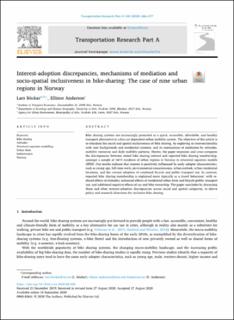| dc.contributor.author | Böcker, Lars | |
| dc.contributor.author | Anderson, Ellinor Ragnhild | |
| dc.coverage.spatial | Norway | en_US |
| dc.date.accessioned | 2021-07-16T11:31:34Z | |
| dc.date.available | 2021-07-16T11:31:34Z | |
| dc.date.created | 2020-09-14T14:59:59Z | |
| dc.date.issued | 2020-09-10 | |
| dc.identifier.citation | Transportation Research Part A: Policy and Practice. 2020, 140 (October), 266-277. | en_US |
| dc.identifier.issn | 0965-8564 | |
| dc.identifier.uri | https://hdl.handle.net/11250/2764678 | |
| dc.description.abstract | Bike sharing systems are increasingly promoted as a quick, accessible, affordable, and healthy transport alternative in a less car-dependent urban mobility system. The objective of this article is to elucidate the social and spatial inclusiveness of bike sharing, by exploring its intersectionality with user backgrounds and residential contexts, and its mechanisms of mediation by attitudes, mobility resources and daily mobility patterns. Hereto, the paper examines and cross-compares the discrepancies between stated bike sharing interest and reported bike sharing membership, amongst a sample of 3672 residents of urban regions in Norway in structural equation models (SEM). Our results indicate that interest is positively influenced by early adopter characteristics, such as young age, full-time work, environmental consciousness, urban outlook, urban residential locations, and the current adoption of combined bicycle and public transport use. In contrast, reported bike sharing membership is explained more typically as a travel behaviour: with reduced effects of attitudes; enhanced effects of residential urban form and bicycle-public transport use; and additional negative effects of car and bike ownership. The paper concludes by discussing these and other interest-adoption discrepancies across social and spatial categories, to derive policy and research directions for inclusive bike sharing. | en_US |
| dc.language.iso | eng | en_US |
| dc.publisher | Elsevier | en_US |
| dc.rights | Attribution-NonCommercial-NoDerivatives 4.0 Internasjonal | * |
| dc.rights.uri | http://creativecommons.org/licenses/by-nc-nd/4.0/deed.no | * |
| dc.title | Interest-adoption discrepancies, mechanisms of mediation and socio-spatial inclusiveness in bike-sharing: The case of nine urban regions in Norway | en_US |
| dc.type | Peer reviewed | en_US |
| dc.type | Journal article | en_US |
| dc.rights.holder | © 2020 The Authors. Published by Elsevier Ltd. | en_US |
| dc.description.version | publishedVersion | en_US |
| cristin.ispublished | true | |
| cristin.fulltext | preprint | |
| cristin.fulltext | original | |
| cristin.qualitycode | 2 | |
| dc.identifier.doi | 10.1016/j.tra.2020.08.020 | |
| dc.identifier.cristin | 1829783 | |
| dc.source.journal | Transportation Research Part A: Policy and Practice | en_US |
| dc.source.volume | 140 | en_US |
| dc.source.issue | October | en_US |
| dc.source.pagenumber | 266-277 | en_US |
| dc.relation.project | Norges forskningsråd: 295704 | en_US |
| dc.relation.project | Norges forskningsråd: 267877 | en_US |
| dc.relation.project | Norges forskningsråd: 250350 | en_US |

